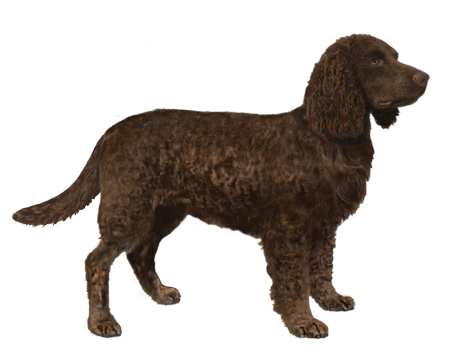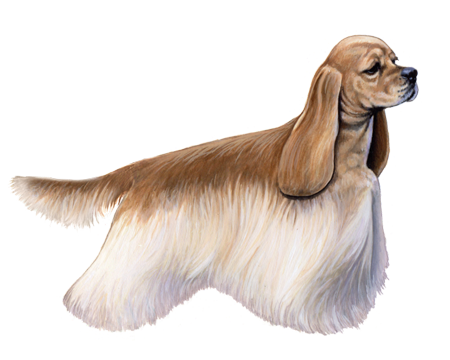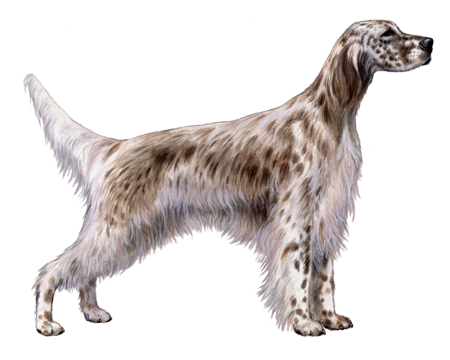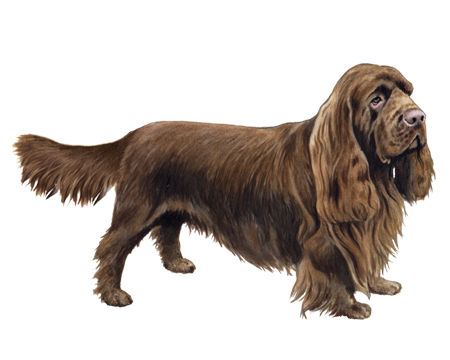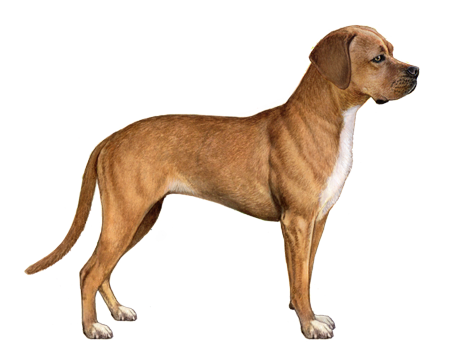
Portuguese Pointer
Bred to work closely with their handlers, Portuguese Pointers are hardy, alert, and eager to please. With their limitless affection and calm, social nature, these smart dogs make fans out of hunters and housemates alike.
Interested in discovering if your dog is a Portuguese Pointer?
Check out Wisdom Panel's DNA tests.

Portuguese Pointer Traits
General Appearance
The Portuguese Pointer is a medium-sized, balanced dog with a square face that sets it apart from other breeds.
Coat and Coloring
The Portuguese Pointer's coat is short and dense. On the back, the hair is somewhat coarse to the touch. But on the head and ears, it's soft and velvety. Like others in the Pointer family, this breed's coat comes in shades of light yellow, yellow, or red-yellow with white patches.
Distinctive Physical Traits
Like their heads, Portuguese Pointers' bodies are almost square. Their ears are triangular and drop style. And their tails are straight and medium length, tapering to a point.
Portuguese Pointer Temperament
The Portuguese Pointer is an energetic breed that loves to be among people and makes a great family pet. Curious by nature, these friendly dogs are fun to be around.
Portuguese Pointers are extraordinarily affectionate and devoted to their family members. However, they can be a little arrogant around other dogs.


Portuguese Pointer History
The Portuguese Pointer descended from the 12th-century Peninsular Pointing Dog from the Iberian Peninsula. Nobles and royals originally bred these handsome dogs for falconry work—a job Portuguese Pointers continue to do in Portugal today.
In the 16th century, Portuguese Pointers grew popular among partridge hunters. In fact, the dogs became known as the perdigueiro—a name derived from the Portuguese word "perdiz," meaning "partridge."
Later, in the 18th century, English families living in the wine region of Portugal brought Portuguese Pointers along when returning to England for vacation. These dogs helped found the English Pointer breed.
Social hardships and lack of ownership nearly wiped out the Portuguese Pointer in the 19th century. But in the 1920s, breeders successfully preserved the breed with the help of dogs in north Portugal.
The Portuguese Pointer has been a member of the American Kennel Club Foundation Stock Service since 2005.
Portuguese Pointer Care
Nutrition
Portuguese Pointers need high-quality food that's appropriate for their life stage (e.g., puppy, adult, senior.) All dogs are at risk for obesity if they eat too many calories. Avoid accidental overfeeding by measuring out meals. And be sure to include calories from treats when calculating their daily intake. As a general guideline, treats should make up no more than 10% of a dog's calories.
Grooming
Keeping a Portuguese Pointer's coat in good shape is relatively easy. All it takes is an occasional once-over with a rubber curry brush to remove loose hair. This breed's coarse hair is rather good at repelling dirt and rarely needs washing.
Your Portuguese Pointer's nails will wear down during regular activity. But you should still inspect them routinely for splits or cracks and trim them as needed. Overgrown nails can be painful and could eventually lead to issues walking or running.
Finally, maintaining good dental hygiene is essential for the overall long-term health of all dogs. In addition to scheduling professional dental cleanings, aim to establish an at-home routine that includes regular teeth brushing.
Exercise
Bred to work, Portuguese Pointers are energetic dogs that need regular exercise and mental stimulation to be happy. They enjoy participating in field trials, agility, tracking, and obedience events. These activities allow dogs to exercise their bodies and minds simultaneously (and provide opportunities for dogs and their people to bond).
These high-endurance dogs also like going on long walks, jogs, and hikes. In the backyard, games of fetch are yet another fun way for Portuguese Pointers to burn off energy and show off their innate retrieving skills.
Training
The intelligence and patient nature of the Portuguese Pointer make it an easy breed to train. These dogs respond well to gentle, reward-based training using favorite treats or toys. And remember, early socialization helps all breeds develop into well-mannered adult dogs.
Breed Group
Sporting
The sporting group breeds are incredibly diverse in personality and appearance, but can be characterized as very sturdy. They were developed to work closely with people and in general have a very responsive nature and high intelligence.




